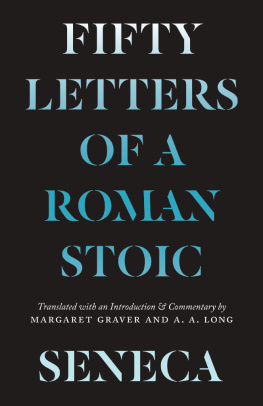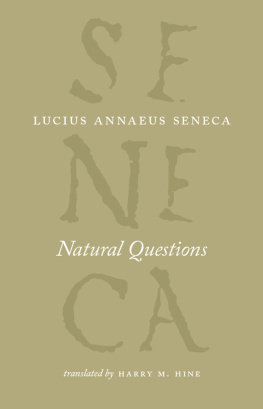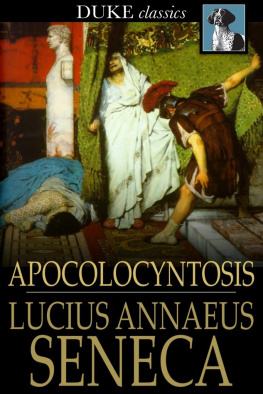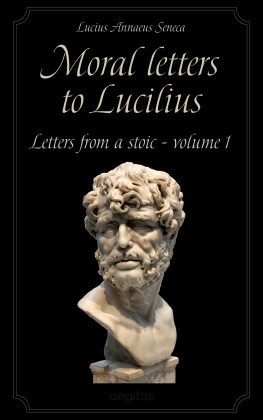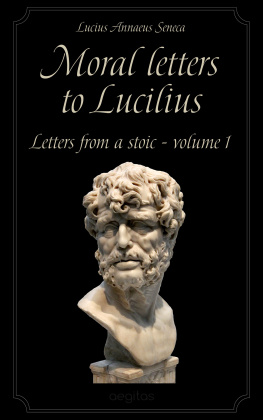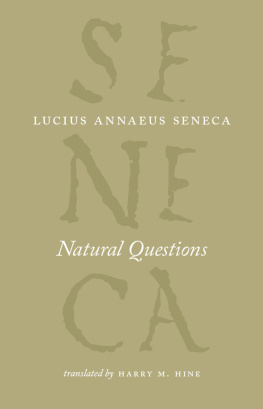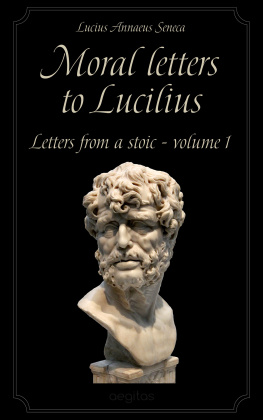Lucius Annaeus Seneca - Letters from a Stoic. Epistulae morales ad Lucilium
Here you can read online Lucius Annaeus Seneca - Letters from a Stoic. Epistulae morales ad Lucilium full text of the book (entire story) in english for free. Download pdf and epub, get meaning, cover and reviews about this ebook. year: 1969, publisher: Penguin Books, genre: Science. Description of the work, (preface) as well as reviews are available. Best literature library LitArk.com created for fans of good reading and offers a wide selection of genres:
Romance novel
Science fiction
Adventure
Detective
Science
History
Home and family
Prose
Art
Politics
Computer
Non-fiction
Religion
Business
Children
Humor
Choose a favorite category and find really read worthwhile books. Enjoy immersion in the world of imagination, feel the emotions of the characters or learn something new for yourself, make an fascinating discovery.
- Book:Letters from a Stoic. Epistulae morales ad Lucilium
- Author:
- Publisher:Penguin Books
- Genre:
- Year:1969
- Rating:5 / 5
- Favourites:Add to favourites
- Your mark:
- 100
- 1
- 2
- 3
- 4
- 5
Letters from a Stoic. Epistulae morales ad Lucilium: summary, description and annotation
We offer to read an annotation, description, summary or preface (depends on what the author of the book "Letters from a Stoic. Epistulae morales ad Lucilium" wrote himself). If you haven't found the necessary information about the book — write in the comments, we will try to find it.
Lucius Annaeus Seneca: author's other books
Who wrote Letters from a Stoic. Epistulae morales ad Lucilium? Find out the surname, the name of the author of the book and a list of all author's works by series.
Letters from a Stoic. Epistulae morales ad Lucilium — read online for free the complete book (whole text) full work
Below is the text of the book, divided by pages. System saving the place of the last page read, allows you to conveniently read the book "Letters from a Stoic. Epistulae morales ad Lucilium" online for free, without having to search again every time where you left off. Put a bookmark, and you can go to the page where you finished reading at any time.
Font size:
Interval:
Bookmark:
E. R. Bevan, Stoics and Sceptics (Heffer, 1965).
The Cambridge Ancient History, vol. X (Cambridge, 1934).
Dio Cassius, Roman History, translated by E. Cary in the Loeb series vols. VIIVIII (Heinemann, 19245).
J. Wight Duff, Literary History of Rome in the Silver Age, with relatively complete bibliographies concerning Seneca and his works (Benn, 1964).
T. S. Eliot, Seneca in Elizabethan Translation in Selected Essays (Faber, 1951).
G. Murray, Stoic, Christian and Humanist, 2nd Edn. pp. 5764, 89118 (Allen and Unwin, Watts, 1940).
Tacitus, The Annals of Imperial Rome, translated by Michael Grant (Penguin Books, 1956).
B. H. Warmington, Nero: Reality and Legend (Chatto and Windus, 1969).
E. F. Watling, introduction to Seneca: Four Tragedies and Octavia (Penguin Books, 1966).
NERO asked if Seneca was preparing for suicide. Gavius Silvanus replied that he had noticed no signs of fear or sadness in his words or features. So Silvanus was ordered to go back and notify the deathsentence. According to one source, he did not return by the way he had come but made a detour to visit the commander of the Guard, Faenius Rufus; he showed Faenius the emperors orders asking if he should obey them; and Faenius, with that ineluctable weakness which they all revealed, told him to obey. For Silvanus was himself one of the conspirators and now he was adding to the crimes which he had conspired to avenge. But he shirked communicating or witnessing the atrocity. Instead he sent in one of his staff-officers to tell Seneca he must die.
Unperturbed, Seneca asked for his will. But the officer refused. Then Seneca turned to his friends. Being forbidden, he said, to show gratitude for your services, I leave you my one remaining possession, and my best: the pattern of my life. If you remember it, your devoted friendship will be rewarded by a name for virtuous accomplishments. As he talked and sometimes in sterner and more imperative terms he checked their tears and sought to revive their courage. Where had their philosophy gone, he asked, and that resolution against impending misfortunes which they had devised over so many years? surely nobody was unaware that Nero was cruel! he added. After murdering his mother and brother, it only remained for him to kill his teacher and tutor.
These words were evidently intended for public hearing. Then Seneca embraced his wife and, with a tenderness very different from his philosophical imperturbability, entreated her to moderate and set a term to her grief, and take just consolation, in her bereavement, from contemplating his well-spent life. Nevertheless, she insisted on dying with him, and demanded the executioners stroke. Seneca did not oppose her brave decision. Indeed, loving her wholeheartedly, he was reluctant to leave her for ill-treatment. Solace in life was what I commended to you, he said. But you prefer death and glory. I will not grudge your setting so fine an example. We can die with equal fortitude. But yours will be the nobler end.
Then, each with one incision of the blade, he and his wife cut their arms. But Senecas aged body, lean from austere living, released the blood too slowly. So he also severed the veins in his ankles and behind his knees. Exhausted by severe pain, he was afraid of weakening his wifes endurance by betraying his agony or of losing his own self-possession at the sight of her sufferings. So he asked her to go into another bedroom. But even in his last moment his eloquence remained. Summoning secretaries, he dictated a dissertation. (It has been published in his own words, so I shall refrain from paraphrasing it.)
Nero did not dislike Paulina personally. In order, therefore, to avoid increasing his ill-repute for cruelty, he ordered her suicide to be averted. So on instructions from the soldiers, slaves and ex-slaves bandaged her arms and stopped the bleeding. She may have been unconscious. But discreditable versions are always popular, and some took a different view that as long as she feared there was no appeasing Nero, she coveted the distinction of dying with her husband, but when better prospects appeared lifes attractions got the better of her. She lived on for a few years, honourably loyal to her husbands memory, with pallid features and limbs which showed how much vital blood she had lost
Meanwhile Senecas death was slow and lingering. Poison, such as was formerly used to execute state criminals at Athens, had long been prepared; and Seneca now entreated his well-tried doctor, who was also an old friend, to supply it. But when it came, Seneca drank it without effect. For his limbs were already cold and numbed against the poisons action. Finally he was placed in a bath of warm water. He sprinkled a little of it on the attendant slaves, commenting that this was his libation to Jupiter. Then he was carried into a vapourbath, where he suffocated. His cremation was without ceremony, in accordance with his own instructions about his death written at the height of his wealth and power.
(Translated by Michael Grant)
JUDGING from what you tell me and from what I hear, I feel that you show great promise. You do not tear from place to place and unsettle yourself with one move after another. Restlessness of that sort is symptomatic of a sick mind. Nothing, to my way of thinking, is a better proof of a well ordered mind than a mans ability to stop just where he is and pass some time in his own company.
Be careful, however, that there is no element of discursiveness and desultoriness about this reading you refer to, this reading of many different authors and books of every description. You should be extending your stay among writers whose genius is unquestionable, deriving constant nourishment from them if you wish to gain anything from your reading that will find a lasting place in your mind. To be everywhere is to be nowhere. People who spend their whole life travelling abroad end up having plenty of places where they can find hospitality but no real friendships. The same must needs be the case with people who never set about acquiring an intimate acquaintanceship with any one great writer, but skip from one to another, paying flying visits to them all. Food that is vomited up as soon as it is eaten is not assimilated into the body and does not do one any good; nothing hinders a cure so much as frequent changes of treatment; a wound will not heal over if it is being made the subject of experiments with different ointments; a plant which is frequently moved never grows strong. Nothing is so useful that it can be of any service in the mere passing. A multitude of books only gets in ones way. So if you are unable to read all the books in your possession, you have enough when you have all the books you are able to read. And if you say, But I feel like opening different books at different times, my answer will be this: tasting one dish after another is the sign of a fussy stomach, and where the foods are dissimilar and diverse in range they lead to contamination of the system, not nutrition. So always read well-tried authors, and if at any moment you find yourself wanting a change from a particular author, go back to ones you have read before.
Each day, too, acquire something which will help you to face poverty, or death, and other ills as well. After running over a lot of different thoughts, pick out one to be digested thoroughly that day. This is what I do myself; out of the many bits I have been reading I, lay hold of one. My thought for today is something which I found in Epicurus (yes, I actually make a practice of going over to the enemys camp by way of reconnaissance, not as a deserter!). A cheerful poverty, he says, is an honourable state. But if it is cheerful it is not poverty at all. It is not the man who has too little who is poor, but the one who hankers after more. What difference does it make how much there is laid away in a mans safe or in his barns, how many head of stock he grazes or how much capital he puts out at interest, if he is always after what is anothers and only counts what he has yet to get, never what he has already. You ask what is the proper limit to a persons wealth? First, having what is essential, and second, having what is enough.
Font size:
Interval:
Bookmark:
Similar books «Letters from a Stoic. Epistulae morales ad Lucilium»
Look at similar books to Letters from a Stoic. Epistulae morales ad Lucilium. We have selected literature similar in name and meaning in the hope of providing readers with more options to find new, interesting, not yet read works.
Discussion, reviews of the book Letters from a Stoic. Epistulae morales ad Lucilium and just readers' own opinions. Leave your comments, write what you think about the work, its meaning or the main characters. Specify what exactly you liked and what you didn't like, and why you think so.



